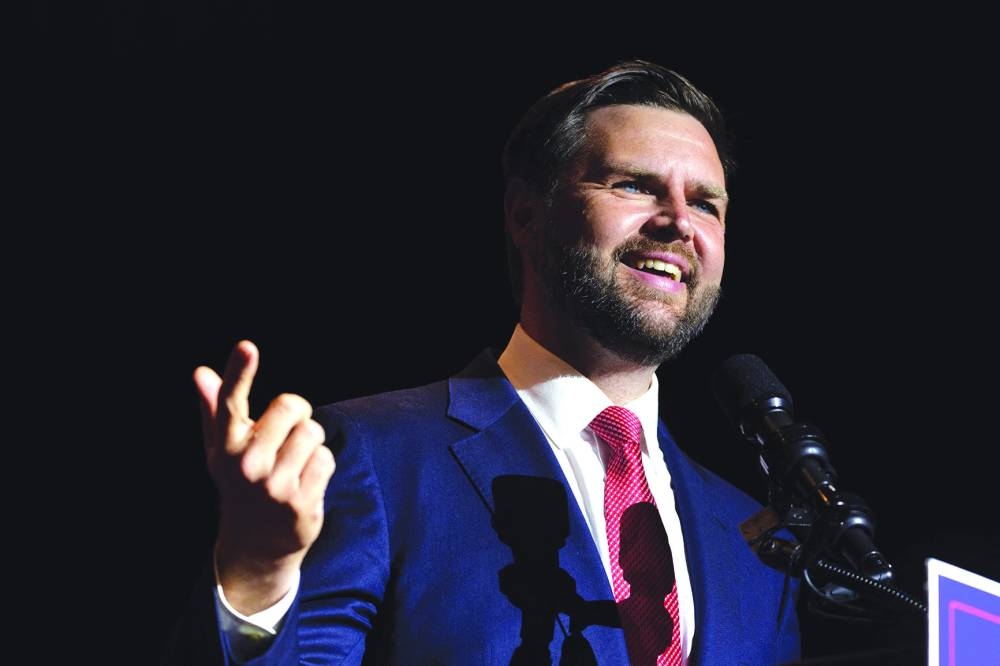In a commentary published by the New York Times this past April, J D Vance, now the Republican vice-presidential nominee, proposed a strategy of “defence” for Ukraine that was nothing but a recipe for defeat. There can be no doubt that his words were closely read, and well received, in Beijing and Moscow. Appeasing Russia at Ukraine’s expense would amount to a major strategic loss for the United States, and thus a victory for its adversaries.
Vance’s advocacy for appeasement should surprise no-one. In a 2022 podcast with Donald Trump’s (currently imprisoned) political guru Steve Bannon, he said: “I don’t really care what happens to Ukraine one way or another.” His argument essentially is that because Russia is larger than Ukraine, it can lob more bombs and missiles than the Ukrainians and their Western backers can handle.
Russia undoubtedly is bigger than Ukraine. But if that is grounds for Ukraine to accept defeat, the same argument could be applied to eight other neighbouring countries that were at some point part of the Russian/Soviet empire. Vance is effectively green-lighting Vladimir Putin’s aspiration to resurrect the old empire through conquest. The only neighbour left would be China, Russia’s “no-limits” partner.
A resurrected Great Russia, in alliance with today’s China, would change the world order. In fact, this is precisely the outcome that both countries’ leaders want. An America in strategic retreat – abandoning Kabul and then Kyiv – would encourage the Eurasian authoritarian bloc to go on the offensive. Taiwan’s days would be numbered, and others might fold even before that happens.
The Prussian military theorist Carl von Clausewitz famously taught us that war is a contest of political wills. Arsenals and battalions certainly count, but they often are not what matters in the end. The outcome in Afghanistan was not decided by which side had more artillery ammunition. Again, if you believe that firepower is everything, you must also believe that Taiwan should just go ahead and surrender.
Putin has made no secret of his war aims. While “interviewing” the Russian leader this past February, the right-wing activist Tucker Carlson did us a great favour by letting his subject ramble on about his dream of wiping Ukraine off the map. The issue was never really about Ukrainians who speak Russian or Nato expansion or anything else. Rather, having resurrected the classic Russian imperialist view, Putin believes that Ukraine simply has no right to exist as an independent state.
Where this logic ends is anyone’s guess. After all, Poland, Finland, Latvia, Estonia, Lithuania, Georgia, Azerbaijan, and Kazakhstan were all once part of the empire that Putin seeks to restore. If Ukraine can be defeated because the US decided to walk away, all bets are off. With so many countries that are smaller than Russia, Vance would have to repeat his facile argument ad nauseam.
The defence of Ukraine obviously rests primarily with the Ukrainians. It is their blood soaking into the battlefield, and it is they who have shouldered the awesome responsibility of defending the West despite the odds against them. When the war started, no one expected them to last more than a few weeks, if not days. But they did, inflicting grievous damage on Russia’s military. That alone is a victory of sorts.
The price the rest of us are paying is minute. For EU member states, it amounts to around 0.3% of GDP, on average – a little more than one-tenth of our defence spending; for the US, it is significantly less. True, Europe has allowed its own defence industrial bases – the capacity to produce everything from artillery ammunition to air-defence missiles – to decay. But allowing Russia to swallow Ukraine would not relieve us of the burden of correcting that mistake. On the contrary, we would be left with an even more threatening strategic environment. The aggressor in the Kremlin would be on the march.
Vance is not wrong to argue that Ukraine’s strategy now should be primarily defensive. Last year’s counteroffensive made little headway and fell far short of its goals. But rather than withdrawing support for Ukraine, we should recognise that it is the only credible strategy for achieving some semblance of peace down the road. To stand by and let Russian bombers pulverise Kharkiv and Odesa would let loose the dogs of war for years to come.
Eventually, the guns will fall silent. But no true peace will be possible until Putin’s imperial dream has been defeated. Russia must accept its role as a normal nation-state among others, and Ukraine’s democracy and security must be secured through integration into the Euro-Atlantic institutions. Only then should the details of the relationship between Kyiv and Moscow be sorted out.
I agree with Vance that Europeans bear a huge responsibility here. But he should know that European financial support already exceeds that of the US, and that the European Union has started the process of making Ukraine a formal member. That is a huge, strategically important step.
But it is not just European security that is at stake. In his address to the US Congress this past April, Japanese Prime Minister Fumio Kishida did not mince words: “Ukraine today could be East Asia tomorrow.” Will Vance advocate appeasement there, too? If so, and if the Republicans win the US presidency in November, we will find ourselves in a world where Western values and interests are fully in retreat. — Harris ‘easier’ to beat: Trump
• Carl Bildt is a former prime minister and foreign minister of Sweden.

J D VANCE: In a 2022 podcast, Republican candidate Donald Trump’s running mate said: “I really don’t care what happens to Ukraine one way or another”.
